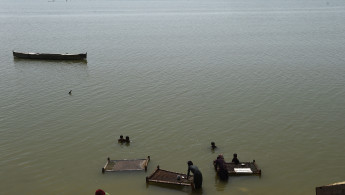Pakistan: Swelling lake could cause more flooding, officials say
Officials warned Sunday that more flooding was expected as Lake Manchar in southern Pakistan swelled from unprecedented monsoon rains that began in mid-June and have killed nearly 1,300 people.
Meteorologists predicted more rain in the region in the coming days and authorities urged villagers in the Jamshoro and Dadu districts of Sindh province near the lake to evacuate. The rising waters reached dangerous levels and posed a threat to a protective dyke and embankment, they said. The lake, located west of the Indus River, is the largest natural freshwater lake in Pakistan and one of the largest in Asia.
Fariduddin Mustafa, administrator for the Jamshoro district, said on Sunday that officials made a cut into the lake's embankment to allow excess water to escape and ultimately flow into the Indus. Still, the water continues to rise, he said.
Parts of Dadu district have already been flooded, officials said.
"After we assessed water levels reached (a) dangerous level and there was fear that the embankment of the lake might be caved in at any time, the administration decided to make a cut on the Bagh-e-Yousuf side to avert any uncontrollable flow of water," he said.
The development comes a day after Pakistan appealed again to the international community for aid to victims of the unprecedented flooding from monsoon rains that have left nearly 1,300 people dead and millions homeless around the country. Planes from multiple countries have been bringing supplies to the impoverished country across a humanitarian air bridge.
Multiple officials and experts have blamed the unusual monsoon rains and flooding on climate change, including UN Secretary General Antonio Guterres, who last week called on the world to stop "sleepwalking" through the deadly crisis. He will visit Pakistan on Sept. 9 to tour flood-hit areas and meet with officials.
In its latest report, Pakistan's National Disaster Management Authority put the death toll since mid-June - when monsoon rains started weeks earlier this year - at 1,290 as more fatalities were reported from flood affected areas of Sindh, Khyber Pakhtunkhwa and Baluchistan provinces.
The authority said relief and rescue operations continued on Sunday with troops and volunteers using helicopters and boats to get people stranded out of flooded areas to relief camps where they were being provided shelter, food and health care.
Scores of relief camps have been set up in government buildings servicing tens of thousands of people while thousands more have taken shelter on roadsides on higher ground.
According to initial government estimates, the devastation has caused $10 billion in damage but Planning Minister Ahsan Iqbal said Saturday "the scale of devastation is massive and requires an immense humanitarian response for 33 million people".
The renewed request for international aid came as Pakistan has received 30 planes load of relief goods from Turkey, China, UAE, France, Uzbekistan and other countries with more planes expected in the coming days.
Two members of Congress, Sheila Jackson and Tom Suzy, were expected to arrive in Pakistan Sunday to visit the flood-affected areas and meet officials.





 Follow the Middle East's top stories in English at The New Arab on Google News
Follow the Middle East's top stories in English at The New Arab on Google News


